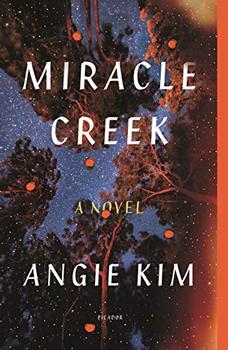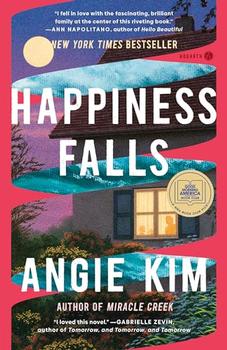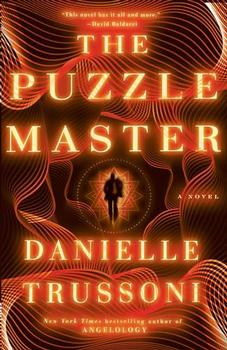Summary | Excerpt | Reading Guide | Discuss | Reviews | Beyond the book | Read-Alikes | Genres & Themes | Author Bio

Miracle Creek, the debut novel from Angie Kim, hinges on the mysterious explosion of an oxygen tank. This disaster has unfolded at Miracle Submarine—a treatment center in rural Virginia specializing in hyperbaric oxygen therapy, or HBOT (see Beyond the Book)—which has attracted customers seeking help for various conditions. The explosion has killed Kitt Kozlowski, who was in the tank with her autistic son TJ, and Henry Ward, a boy who may have been autistic but had conflicting diagnoses. Henry's mother, Elizabeth, who was outside at the time of the incident, is now on trial for murder, with many believing she started the fire that caused the explosion because she wanted her son dead.
While the mystery of how the explosion happened fuels Miracle Creek, the novel looks at responsibility beyond the question of who or what killed Henry and Kitt. For example, Miracle Submarine's technician, Pak Yoo, wasn't properly supervising the HBOT session when the tank exploded, having asked his wife, Young, to cover for him. Pak and Young have agreed to keep this detail a secret, believing it's not important to the case. As it turns out, multiple people involved in the explosion, including the Yoos' daughter Mary, have their own guilty secrets about the night it occurred.
We get to know the characters through short, riveting third-person narratives—with the exception of some first-person accounts from Young. These narratives provide backstory and show the progression of the trial. The content of the case isn't pleasant, but watching it unfold is mesmerizing. Snappy courtroom scenes feature Abe, a crowd-pleasing prosecutor, and Shannon, an attorney with a flair for disconcerting witnesses. Both lawyers twist the case in unexpected directions.
Kim also digs into social factors surrounding the explosion. We see how Pak, a Korean immigrant, hoped to use HBOT to give his family financial footing in the U.S. In one flashback, racial tensions flare between Janine, a Korean-American doctor who supports Pak's venture, and her non-Korean husband Matt, also a doctor, who's reluctant to get involved with Miracle Submarine. Janine accuses Matt of being "against anything Asian." Whether or not it's true, her accusation points to the possibility that Matt doesn't appreciate what's at stake for the Yoos, personally or financially.
It's interesting to compare the Yoos' situation with that of Miracle Submarine's customers, namely mothers of children with conditions such as autism and cerebral palsy. Like Pak and Young, the mothers who invested in HBOT did so hoping it might give them and their offspring a shot at a more "normal" life. Like all of the Yoos, the mothers face above-average societal pressure and scrutiny. It's hard not to wonder if Pak or his customers would have put their hopes into HBOT if they weren't excluded from mainstream society. In recollections of the time leading up to the explosion, when Miracle Submarine's operations are threatened by protesters against treatment for autism, Pak and some of the mothers experience frustration, and certain mothers feel fear and self-doubt.
The novel is sensitive towards social issues in general, but I would have liked to see it look at ableism and medical abuse more critically. To be fair, we do see the court examine the question of what constitutes medical abuse. We also see HBOT moms question whether they've chosen treatments for their kids based on quality of life or their own desire for social normalcy. Elizabeth recalls Kitt saying to her, "Why do you keep doing this shit? I think the protesters might have a point with you," referring to a chemical treatment Elizabeth has mentioned. However, these instances are overshadowed by disproportionally sympathetic portrayals of the mothers' own troubles, as well as simplistically harsh depictions of the aggressive anti-HBOT protesters. This prevents the kind of deep exploration we get of other issues, such as the dilemma of having selfish desires as a mother, which a few characters discuss at length.
Despite this imbalance, Miracle Creek ultimately puts trust in readers to come to their own conclusions concerning hard questions—about racism, sexism, ableism, and justice. By showing us how little the truth may matter in a legal setting, Kim creates the eerie feeling that it's up to us to make our own decisions about the guilt or innocence of her characters, and that's no easy task. This is a book that demands an audience willing to approach it with care, and it deserves to find that audience.
![]() This review was originally published in The BookBrowse Review in May 2019, and has been updated for the
April 2020 edition.
Click here to go to this issue.
This review was originally published in The BookBrowse Review in May 2019, and has been updated for the
April 2020 edition.
Click here to go to this issue.

If you liked Miracle Creek, try these:

by Angie Kim
Published 2024
When a father goes missing, his family's desperate search leads them to question everything they know about him and one another in this thrilling page-turner, a deeply moving portrait of a family in crisis from the award-winning author of Miracle Creek.

by Danielle Trussoni
Published 2024
Reality and the supernatural collide when an expert puzzle maker is thrust into an ancient mystery—one with explosive consequences for the fate of humanity—in this suspenseful thriller from the New York Times bestselling author of Angelology
Harvard is the storehouse of knowledge because the freshmen bring so much in and the graduates take so little out.
Click Here to find out who said this, as well as discovering other famous literary quotes!
Your guide toexceptional books
BookBrowse seeks out and recommends the best in contemporary fiction and nonfiction—books that not only engage and entertain but also deepen our understanding of ourselves and the world around us.